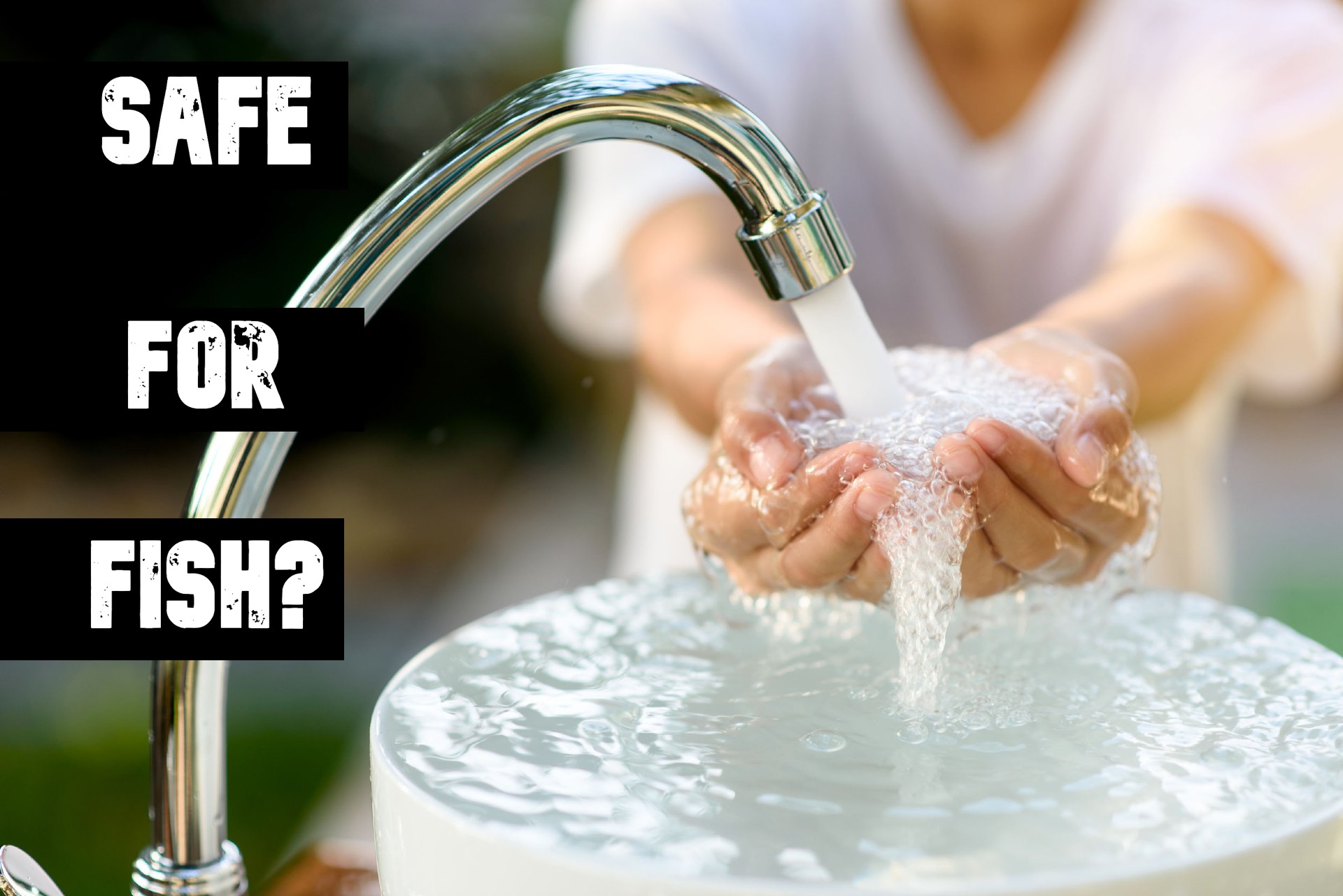If you’ve been to any sort of aquarium and seen a sign saying, “Don’t tap on the glass!” you might be wondering why it’s such a problem. At first glance, it seems like a bit of an overreaction. After all, fish don’t have any visible ears, and a tap coming from outside the tank can seem like a pretty small disturbance. If you keep fish of your own, you have probably also realized that some fish have a more naturally shy personality than other fish and spent a lot of their time in hiding. A few solid taps usually do the trick to get them to come out, so is it really that big of a deal to stop tapping on fish tanks?
The answer is yes, you should stop tapping on fish tanks. Although it might not sound overly loud to you, a human, on the outside of the tank, the sounds of your tapping are increased when moving as sound waves through water. The tapping sounds very loud to your fish and can cause them serious levels of stress! Stress has been known to cause injuries in fish, as well shorten their lifespan. In order to better understand the point of view of your fish when it comes to tapping on glass, it helps to better understand the science of what is happening to sound underwater.
Tapping on Fish Tanks Create Sound through Water
All sound creates waves, whether it’s through the air or through the water. For humans, sound waves travel through the air and cause our eardrums to vibrate. Our brains register this vibration as sound. The closer we are to the source of the sound, the more potent the waves are, and we perceive the sound as louder. Sounds that are too loud can cause the vibrations in your ear to become painful, which is why your ears can hurt if you are too close to loud noise without ear protection.
When sounds move through water, the waves travel five times faster than it does through air. If you were to submerge your head and hear a sound that was made underwater, it would sound louder to you. You would also be able to feel some of the vibrations of the sound with your body because these vibrations would be picked up by your whole body, not just your eardrums. This means that even a soft tapping on the side of the fish tank will be amplified and sound much louder underwater. To your fish, who will not be able to identify the source of the sound right away, this is likely to trigger a panic response.
Sound can also travel for longer distances over water. Even if you tap on the other side of the tank from where your fish is hiding, they are still going to hear it very loudly. Even a fish hiding in a cave or other hiding place is not going to be safe from the loud sound.

Do Fish Have Ears?
Fish do not have ears in the same sense that humans do, however they do possess unique organs for interpreting sound. Fish have lateral lines and otoliths, which are both used to hear. Lateral lines are a system of sensors that detect vibrations in the water. This can be used for things like detecting currents, but also affects how the fish react to sound. Since sound waves produce a vibration, fish can feel sounds throughout their entire bodies. Otoliths, which are also called “ear stones”, also are used by fish for hearing. Like humans, these organs also help in coordinating balance.
Effects of Stress on Fish
Now that we have established that fish can hear and are indeed sensitive to sounds in water, we can explore why the tapping sound is bad for your fish. Any sudden, loud sound is going to startle your fish. The instinct for any animal when startled is to activate its fight or flight response. Your fish is most likely going to try and escape the sound, which it is perceiving as a danger. A fish isn’t going to slowly and carefully swim away in this scenario- it’s going to dart away as fast as it can because its brain is going to produce a jolt of adrenaline. This puts the fish in danger of bodily harm and injury because it could swim into a hard or sharp object at top speed. Fish have even been known to swim into the sides of their tank, which can cause them to be stunned if there is a fast-enough momentum.
Immediate injury aside, the stress of activating the fight or flight response can have long-term health effects on your fish. If your fish hears these tapping sounds often, it is going to get the impression that its environment is unsafe- which is problematic when your fish is confined to the walls of the tank and can’t flee. The adrenaline that’s released during the flight response is also not meant to be triggered very often. This stress chemical will cause a spike in the fish’s heart rate, blood pressure, and breathing rate. While this is fine in the wild, and useful in making a quick escape, having your fish’s bodywork overtime 24/7 will cause your fish to become exhausted. Over-exertion can be lethal for fish, so it’s important that you help your fish feel safe in their home.
Fish that are stressed over time also show an increase in the stress hormone called cortisol.
This chemical can cause your fish to become stunted and develop digestive problems. This can lead to even further complications because if your fish isn’t keeping itself growing and strong, it can become susceptible to parasites and disease. Keeping your fish in a constant state of stress is cruel, and as a responsible aquarist, you are responsible for providing your fish with an environment where it can feel safe and calm. This includes preventing people from tapping on the tank! If you live in a house with young children, take the time to teach them how to treat an aquarium.
How to Get your Fish’s Attention without Tapping
If you have a particularly shy fish that doesn’t seem to want to come out of its hiding place, there are plenty of things you can do to coax it out that are not tapping the glass. It helps if you can figure out the likely reason why the fish is hiding. If there are aggressive tank mates that give it a hard time, consider separating those fish or planting a dense screen of plants so that the fish can still have some cover when it exits the hiding place. Another factor to consider is the natural instincts of the fish in particular- is your fish nocturnal? Some fish are active at night, and you will be able to get a much better look at them after sundown. There are a variety of lights on the market that can mimic natural day and night cycles, which will help you get a better look at some of your late-night fish.
Food is another great motivator for tempting your fish out of hiding, and it can also help your fish bond with you and establish a trusting relationship. If your usual flake food isn’t enough to get things moving, try a tasty treat like bloodworms, daphnia, or brine shrimp. Most of these treats are readily available online or at your local pet supply store, and come live, frozen, or freeze-dried depending on your preference.
Conclusion
Tapping on the glass of a fish tank is never a good idea and can cause your fish a lot of unnecessary stress and potential harm. Although fish don’t have ears in the same way that humans do, they have hearing organs that can sense sound waves very acutely. It’s important to remember that sound waves travel differently in water than air, often louder and with a wider reach. Tapping on the glass, or other environmental stressors should be reduced as much as possible when interacting with your fish tank.
Fish are sensitive to stress and should live in an environment that feels as safe and calm as possible. Fish that are exposed to stress for a long time are at risk of developing unhealthy behaviors that open the risk of illness and parasites. If you are tapping on the glass of your aquarium in order to get a reaction from your fish, it’s a good idea to do some research and find a better way to interact with each other.
Finally, if you live in a household with children or other people who do not have experience with aquariums, be sure to educate them on the proper ways to interact with a fish tank. Aquariums are a great addition to any home, with proper care and research. As a pet owner, you are responsible for providing your fish with the best quality of life possible, and that means not stressing them out as much as possible.
Related Topics
If you like the article above, here are some other similar articles you should check out!
Best LED Lighting for 125-150 Gallon Aquariums





